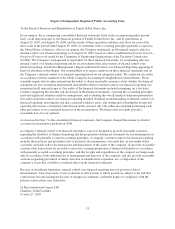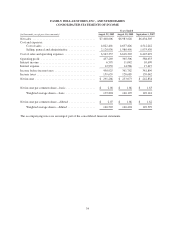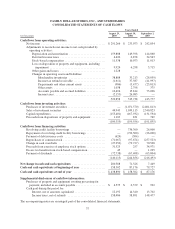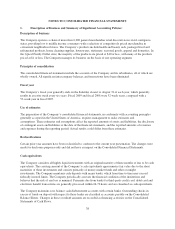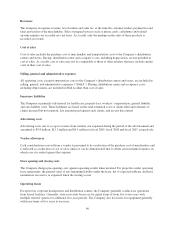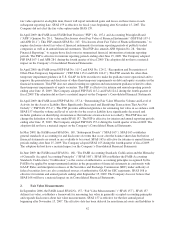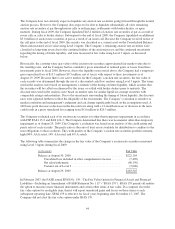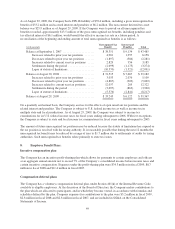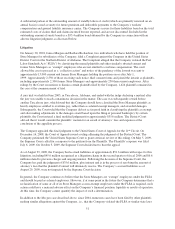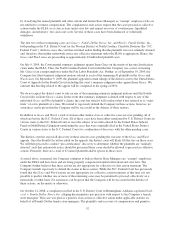Family Dollar 2009 Annual Report Download - page 50
Download and view the complete annual report
Please find page 50 of the 2009 Family Dollar annual report below. You can navigate through the pages in the report by either clicking on the pages listed below, or by using the keyword search tool below to find specific information within the annual report.fair value option for an eligible item, then it will report unrealized gains and losses on those items at each
subsequent reporting date. SFAS 159 is effective for fiscal years beginning after November 15, 2007. The
Company did not elect the fair value option under SFAS 159.
In April 2009, the FASB issued FASB Staff Position (“FSP”) No. 107-1 and Accounting Principles Board
(“APB”) Opinion No. 28-1, “Interim Disclosures about Fair Value of Financial Instruments” (FSP FAS 107-1
and APB 28-1”). This FSP amends SFAS No. 107, “Disclosures about Fair Value of Financial Instruments,” to
require disclosures about fair value of financial instruments for interim reporting periods of publicly traded
companies as well as in annual financial statements. This FSP also amends APB Opinion No. 28, “Interim
Financial Reporting,” to require those disclosures in summarized financial information at interim reporting
periods. The FSP is effective for interim reporting periods ending after June 15, 2009. The Company adopted
FSP FAS 107-1 and APB 28-1 during the fourth quarter of fiscal 2009. The adoption did not have a material
impact on the Company’s Consolidated Financial Statements.
In April 2009, the FASB issued FSP FAS No. 115-2 and FAS No. 124-2, “Recognition and Presentation of
Other-Than-Temporary Impairments” (“FSP FAS 115-2 and FAS 124-2”). This FSP amends the other-than-
temporary impairment guidance in U.S. GAAP for debt securities to make the guidance more operational and to
improve the presentation and disclosure of other-than-temporary impairments on debt and equity securities in the
financial statements. This FSP does not amend existing recognition and measurement guidance related to other-
than-temporary impairments of equity securities. The FSP is effective for interim and annual reporting periods
ending after June 15, 2009. The Company adopted FSP FAS 115-2 and FAS 124-2 during the fourth quarter of
fiscal 2009. The adoption did not have a material impact on the Company’s Consolidated Financial Statements.
In April 2009, the FASB issued FSP FAS No. 157-4, “Determining Fair Value When the Volume and Level of
Activity for the Asset or Liability Have Significantly Decreased and Identifying Transactions That Are Not
Orderly” (“FSP FAS 157-4”). This FSP provides additional guidance for estimating fair value in accordance with
SFAS 157 when the volume and level of activity for the asset or liability have significantly decreased and
includes guidance on identifying circumstances that indicate a transaction is not orderly. This FSP does not
change the definition of fair value under SFAS 157. The FSP is effective for interim and annual reporting periods
ending after June 15, 2009. The Company adopted FSP FAS 157-4 during the fourth quarter of fiscal 2009. The
adoption did not have a material impact on the Company’s Consolidated Financial Statements.
In May 2009, the FASB issued SFAS No. 165, “Subsequent Events” (“SFAS 165”). SFAS 165 establishes
general standards of accounting for and disclosure of events that occur after the balance sheet date but before
financial statements are issued or are available to be issued. SFAS 165 is effective for interim or annual financial
periods ending after June 15, 2009. The Company adopted SFAS 165 during the fourth quarter of fiscal 2009.
The adoption did not have a material impact on the Company’s Consolidated Financial Statements.
In June 2009, the FASB issued SFAS No. 168, “The FASB Accounting Standards Codification and the Hierarchy
of Generally Accepted Accounting Principles” (“SFAS 168”). SFAS 168 establishes the FASB Accounting
Standards Codification (“Codification”) as the source of authoritative accounting principles recognized by the
FASB to be applied by nongovernmental entities in the preparation of financial statements in conformity with
GAAP. Rules and interpretive releases of the Securities and Exchange Commission (SEC) under authority of
federal securities laws are also considered sources of authoritative GAAP for SEC registrants. SFAS 168 is
effective for interim and annual periods ending after September 15, 2009. The Company does not believe that
SFAS 168 will have a material impact on its Consolidated Financial Statements.
2. Fair Value Measurements:
In September 2006, the FASB issued SFAS No. 157, “Fair Value Measurements” (“SFAS 157”). SFAS 157
defines fair value, establishes a framework for measuring fair value in generally accepted accounting principles
and expands disclosures about fair value measurements. SFAS 157 is effective for the first annual period
beginning after November 15, 2007. The effective date has been delayed for non-financial assets and liabilities to
42



